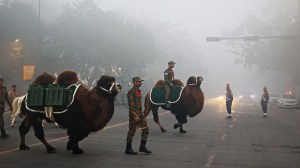Strobe highlights
As far as perceptive and peripatetic India watchers go, there are few to beat Strobe Talbott, the former US deputy secretary of state. Not o...

As far as perceptive and peripatetic India watchers go, there are few to beat Strobe Talbott, the former US deputy secretary of state. Not only has he visited this region regularly over a span of 30 years, he has been following, with a trained and careful eye, the contours of America8217;s engagement with India 8212; and Pakistan. In fact, he has even had occasion under the Clinton administration to help shape it. All this makes his views on US-India, not just interesting, but unusually informed. The 8216;Walk the Talk8217; interview he did for NDTV, excerpts of which were carried in the Express, outlined a brief history of an uncertain time. It was a period demarcated by the Cold War, at one end, and globalisation, at the other; the turbulent Indira Gandhi-Richard Nixon interactions, at one end, and the far smoother Atal Bihari Vajpayee-George Bush relationship, at the other.
It was also a period when the region went nuclear. The Bomb 8212; and the geo-political dynamics it unleashed in the region 8212; has, in Talbott8217;s assessment, been a crucial factor in influencing American policy vis-a-vis South Asia. Given his vantage point and the fact that he can speak for the American political establishment having been part of it, there is no reason to disbelieve him. The tough questions that he poses to the Indian political establishment with regard to its nuclear policy therefore merit attention. They also merit answers, not so much for the sake of Indo-US ties, but for ourselves and our future policies. These, then, are the questions he raises: What will India do in institutionalising its moratorium on the testing of nuclear weapons? What will it do in order to achieve a treaty that cuts off the production of fissile material? What will it do to constrain and then stabilise the competition with its neighbours over ballistic missiles and nuclear weapons?
The days when questions of this kind could be dismissed out of hand are over. A rapidly gobalising world has little patience with nations it regards as irresponsible in nuclear terms. Further, it has unprecedented leverage that it will not hesitate to use against them. Libya and Iran were only recognising this when they let the world know that they had been assisted in their nuclear programmes with illegitimate transfers of knowhow from Pakistan. Deep in its proliferation mess, Pakistan has now been forced to realise that nuclear weapons bring with them the responsibility to comply with international norms or risk being regarded a rogue state. India has conducted itself as a nuclear state with responsibility but there is still a great deal to be done in terms of evolving a transparent command-and-control system, complying with international best practices and norms, and working toward stabilising the region in nuclear terms through a meaningful diplomatic and political engagement with its western neighbour.
- 01
- 02
- 03
- 04
- 05































